A quick snapshot of the current situationpublished at 05:00 BST 28 April 2021
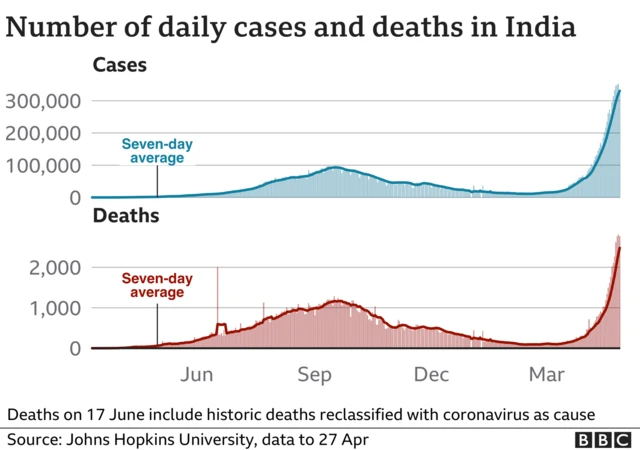
India has seen more Covid cases in the last seven days than any other country
A ferocious second wave has seen the official death toll surpass 200,000 - experts believe the actual number may be higher
People have died waiting for beds, as oxygen supplies run low and hospitals crumble under the strain
Indians are struggling to register online for a mass vaccination programme due to start next month
US President Joe Biden says he intends to send vaccines to India
The BBC is bringing you a special day of coverage across TV, radio and digital on India's crisis
We’re following families as they search for oxygen for loved ones, and getting updates from areas likely to be hit hardest next
Edited by Rebecca Seales and Martha Buckley

Western Maharashtra is India's worst-affected region
The western state of Maharashtra, which has been India's Covid ground zero from the start of the pandemic, is back at the top after briefly reporting a drop in cases.
The state, among India’s richest and home to its financial hub, Mumbai, confirmed more than 66,000 cases last night.
That’s more than any other state, adding to an active caseload that is already the highest in India.
Maharashtra accounts for more than a quarter of India’s 17.9 million cases and nearly a third of India's 201,000 deaths so far.
Mayank Bhagwat of BBC Marathi explains more.
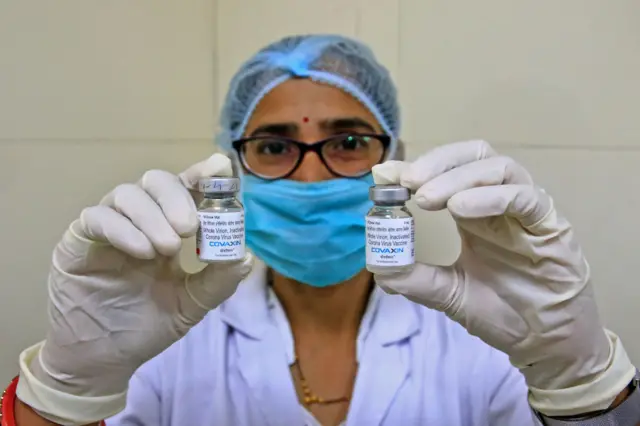 Image source, Getty Images
Image source, Getty ImagesAll adults over the age of 18 to be eligible for Covid-19 vaccines in India
From today, all adults over the age of 18 will be eligible to sign up for Covid-19 vaccines in India.
Despite being the world’s biggest producer of vaccines, only 1.6% of the population have received both doses of the jab so far.
Various states say they'll start administering them to over 18s from 1 May. India is currently vaccinating health workers, front line workers and people over 45.
But despite being such a prolific producer, there are reports of short supply in many places so it’s unclear where these additional doses will come from.
Vikas Pandey
BBC News, Delhi
My days start with panic calls from close friends, family members and sometimes from people I barely know. Today is likely to be no different and a lot of people are going through this. My experience is not unique.
Almost everybody wants one thing – a hospital bed for their loved ones. Sometimes I am successful, but mostly I am not. All the doctors and officials I know are not taking phone calls.
And then there are those who are looking for drugs – mostly the antiviral drug remdesivir that doctors are prescribing to very sick patients. It’s selling at 10 times the official price in the black market but it’s not easy to find even there. Apart from this, there are also frantic calls for oxygen cylinders to help loved ones keep breathing.
There is too much news about death - some because of Covid and others because they simply didn’t get treatment in time. Last night was no different. A close friend of my family’s GP, who he described as like his brother, desperately needs a hospital bed and high-flow oxygen. I think his story will be the story of my day.
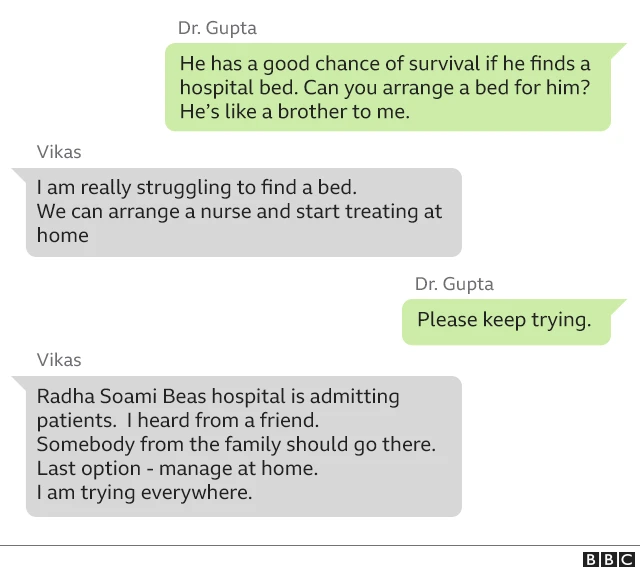
Since last night I’ve made dozens of phone calls to try and help him but I have had no luck yet. I will keep trying.
A Covid variant first found in India has now been detected in at least 17 countries, according to the World Health Organisation.
The WHO said the B.1.617 variant had been detected in over 1,200 sequences, most of which were "uploaded from India, the United Kingdom, USA and Singapore".
But why do new variants of Covid-19 keep appearing? Here's a quick explainer:
Covid variants: What happens when a virus mutates?
Geeta Pandey
BBC News, Delhi
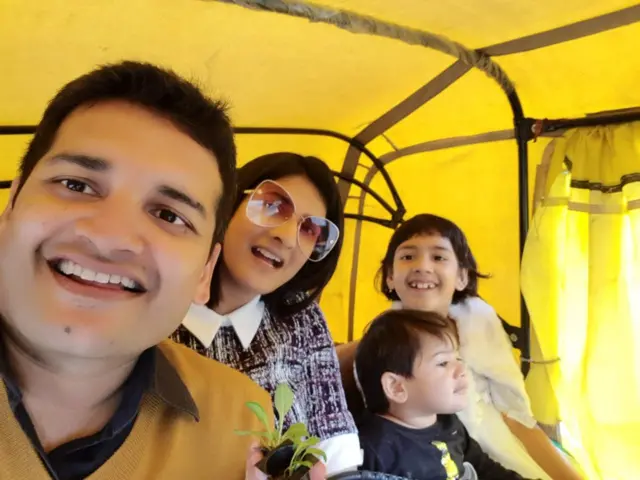 Image source, Supplied
Image source, SuppliedWhen the pandemic started, Ms Singhvi and her husband didn’t need to explain much about the pandemic to their nine-year-old Naaya, whose school had already done a good job in laying out the basics.
And four-year-old Aria - then three - didn’t go out alone anyway, so they didn’t spend much time explaining the situation to her.
But then the whole family tested positive in Delhi a fortnight ago - and it soon became a problem for Aria.
“She doesn’t understand what is a fever or why you should not touch anyone or why she needs to wear a mask. And it became very difficult when she could see other children playing, but wasn’t allowed to play with them.
“So, we told her that coronavirus is a monster and you get a fever when it gets inside your body and if you hug your friends, the monster would want to hug them too and give them a fever. We also told her that if you eat lots of vegetables and drink coconut water, it will kill the monster.
”For the past fortnight since Aria tested positive, Ms Singhvi says, she has been following up on the advice because “she understands from watching TV shows that monsters have to be killed”.
US president Joe Biden said he had a discussion with Indian Prime Minister Narendra Modi about sending across “actual vaccines, which will be my intention to do.” But he has not said when that would happen or how many might be shared.
He said the "problem right now" depended on the US also authorising vaccines like Novovax for its use. The country is currently administering Pfizer, Moderna and Johnson & Johnson.
“I think we’ll be in a position to be able to share vaccines as well as know-how with other countries who are in real need. That is the hope and expectation,” he said.
“And I might add - when we were in a bind at the very beginning, India helped us.”
In the meantime, Mr Biden said the US would send over antiviral drugs like remdisivir and machine parts for vaccine manufacturing.
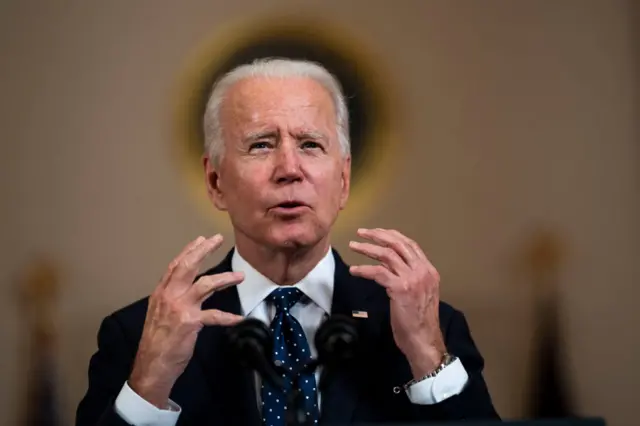 Image source, Getty Images
Image source, Getty ImagesIndia's hardest hit regions are the capital Delhi and the western state of Maharashtra which is home to its financial capital Mumbai. However, the virus is spreading across the entire country.
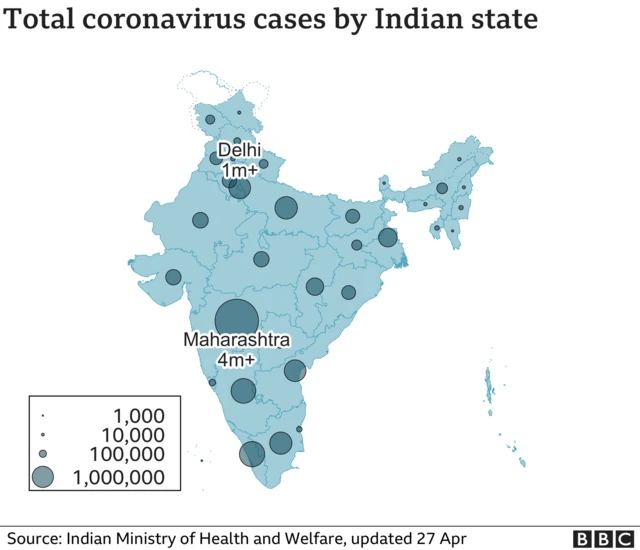
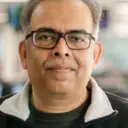 Soutik Biswas
Soutik Biswas
India Correspondent
I have been going to sleep and waking up to WhatsApp groups full of strangers trying to help each other keep their loved ones alive. It’s a stream of pleas and offers - and this is repeated in real life, on the ground and on phone lines across India.
As the day goes on, I will update you on the threads and themes that come up – it’s been the story of India for weeks now since this devastating second wave.
Here’s a sample of what I see every hour, every day. (Names and times have been changed).
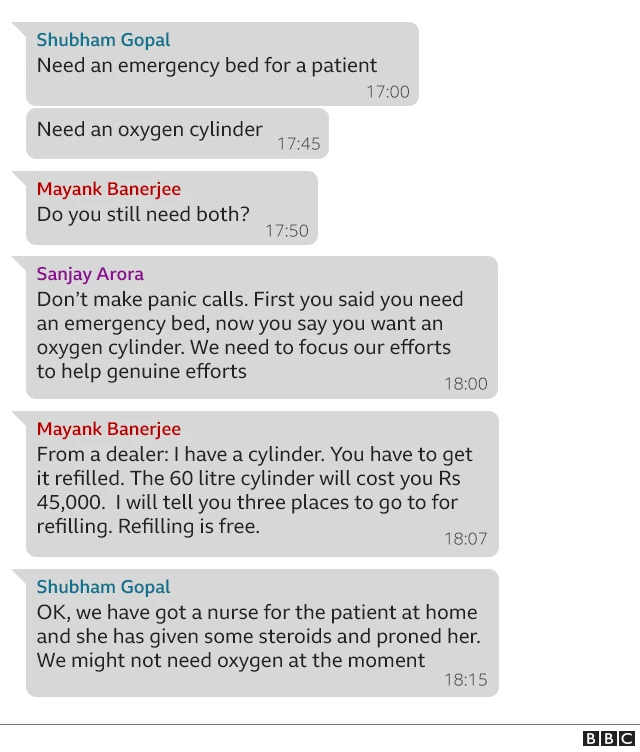
And it goes on. Suddenly, there’s a glimmer of good news.Someone in the group has shared a tweet of a journalist saying that he’s returned home after recovering from Covid-19. There’s a picture of the masked journalist , externalin a car.
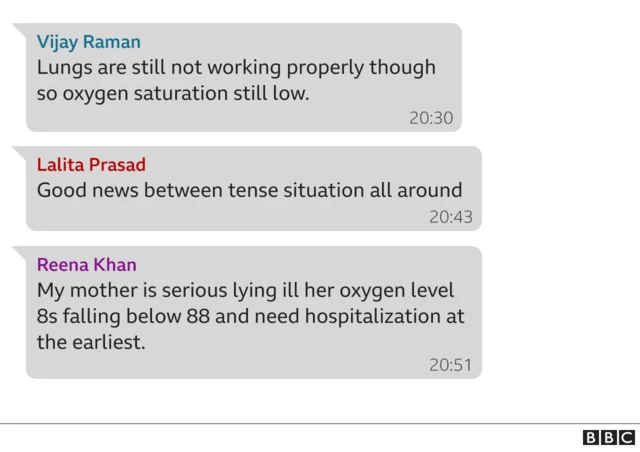
And then...
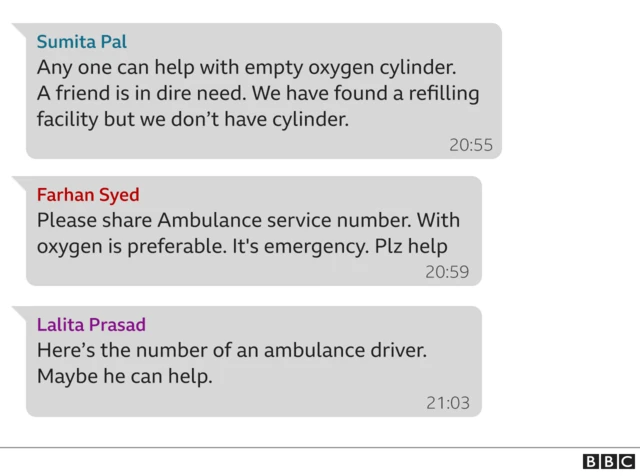
We are following a day in the life of India.
For many Indians that largely unfolds on their social networks - where they are either making or fielding calls for help for themselves or their loved ones.
As the pandemic cripples the country's healthcare system, the burden of finding everything from hospital beds to oxygen has fallen on family and friends. Our correspondents Soutik Biswas and Vikas Pandey are a part of some of these groups on WhatsApp.
We will be following some of the stories that unfold on these groups through the day.
Across the capital city of Delhi, crematoriums have been forced to build makeshift funeral pyres as the city runs out of space to cremate its dead.
Delhi has also registered its highest death toll yet with officials saying 381 people had died in the last 24 hours.
Authorities are reportedly even cutting down trees in city parks for use as kindling on the pyres. Relatives of the dead have also been asked to help with cremations by piling wood and assisting in other rituals - all this, while the death toll continues to rise.
Here's more about the situation on the ground.
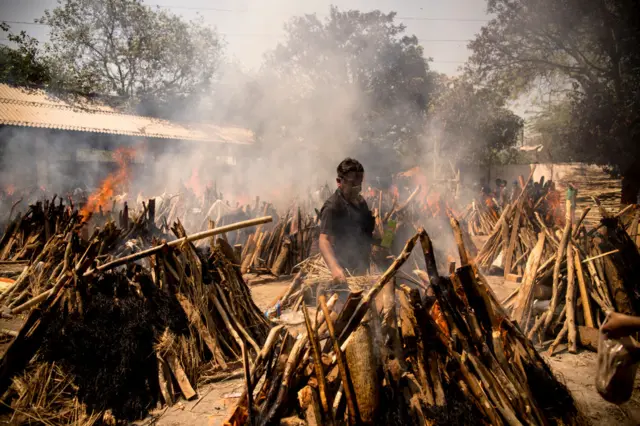 Image source, Getty Images
Image source, Getty Images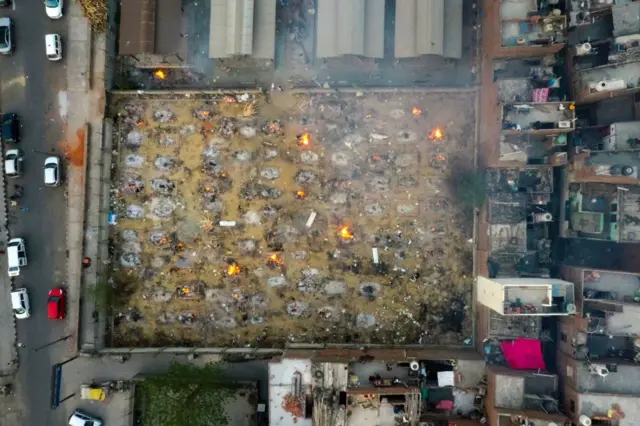 Image source, Getty Images
Image source, Getty Images Ritu Prasad
Ritu Prasad
BBC News writer, Florida
Online, sometimes the distance feels less vast.
Networks of Indian Americans on social media have been sharing ways to help, like information on outbreaks, vaccine availability, or the best organisations to donate to.
One charity's Facebook fundraiser for oxygen supplies has raised $4.4m from more than 63,000 donations in five days. Another geared towards underprivileged communities has raised more than $13,000.
Despite the separation, Indian families in the US are using the web to help in more tangible ways – through information on Whatsapp groups and sharing Google docs of hospital bed availability.
There has been a lot of speculation about the new India variant as cases surge in the country.
Officially known as B.1.617, it was first detected in India in October 2020 (long before the current second wave). How widespread and dangerous it is, is actually still unclear.
Viruses mutate all the time, producing different versions or variants of themselves.
There’s also insufficient data on the new strain.
But fear about it and India’s rising numbers has led to many countries shutting out all flights from the country. Read more this here.
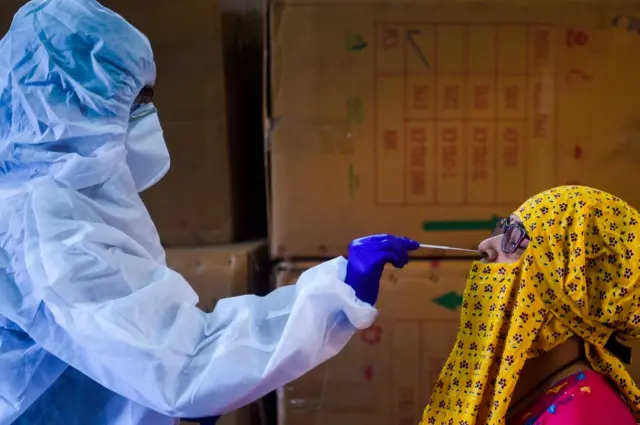 Image source, Getty Images
Image source, Getty ImagesThe story of Rajeshwari Devi, 58, who died after waiting for two days to get uninterrupted oxygen has become a depressingly familar one in India’s capital.
She kept waiting and gasping but it was too late by the time help arrived.
She spent around 36 hours in the emergency room on oxygen support in the northern Indian district of Robertsganj. And then the staff there told her family they were running out of oxygen and she needed to be moved to a bigger hospital but there was no ambulance or any promise of a bed.
The desperate family took her in their car to a hospital where a bed was available after a politician intervened. She had no oxygen support in the car - she died minutes before she could be admitted to hospital.
As we wake up to a new day in India, here's a glimpse at the situation in the country over the past 24 hours:
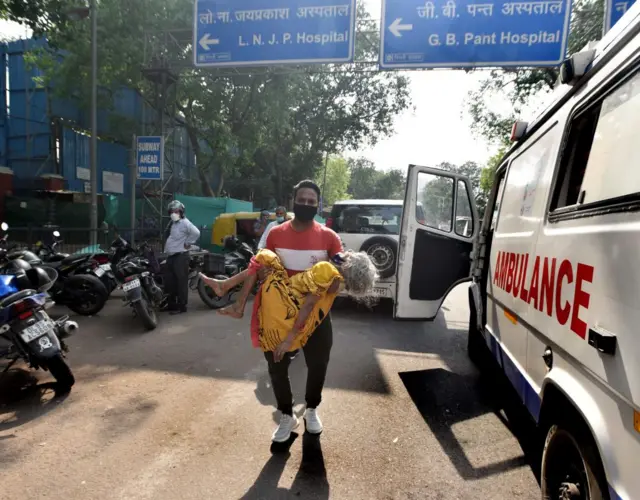 Image source, Getty Images
Image source, Getty Images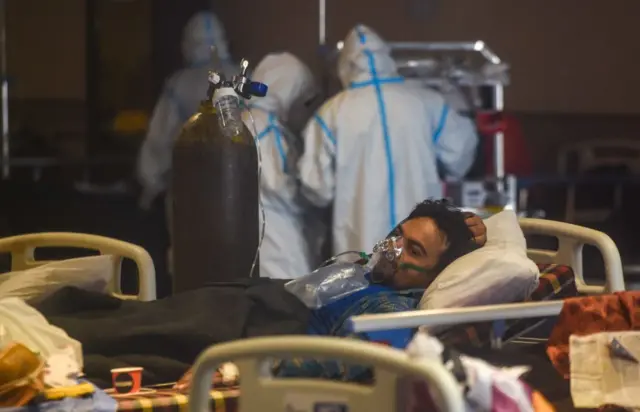 Image source, Getty Images
Image source, Getty Images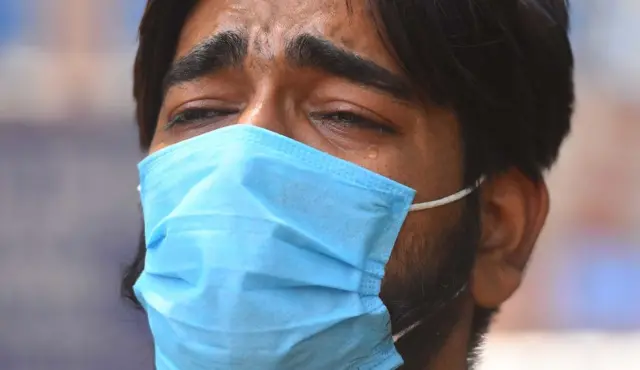 Image source, Getty Images
Image source, Getty ImagesIndia has crossed another tragic threshold with officials saying that 200,000 people have died of Covid in the country as of Tuesday.
The country also saw more than 3,000 fatalities in one day for the first time, with officials saying that 3,286 people died on Tuesday. A recent surge of infections has brought the country to its knees - two million infections were recorded in just one week.
India currently has the fourth highest death toll in the world, behind the US, Brazil and Mexico. Yet in none of those countries is the crisis as urgent as it is presently in India.
India’s second wave has struck with devastating force, with more than two million cases recorded in a week and 200,000 deaths overall.
Hospitals in numerous cities are being pushed to the brink, oxygen supplies are dangerously low and makeshift funeral pyres burn day and night.
Meanwhile, a thriving black market has emerged as people scramble to help their desperately ill family and friends.
It is against this backdrop that the BBC is bringing you a special day of coverage, speaking to our reporters across the country.